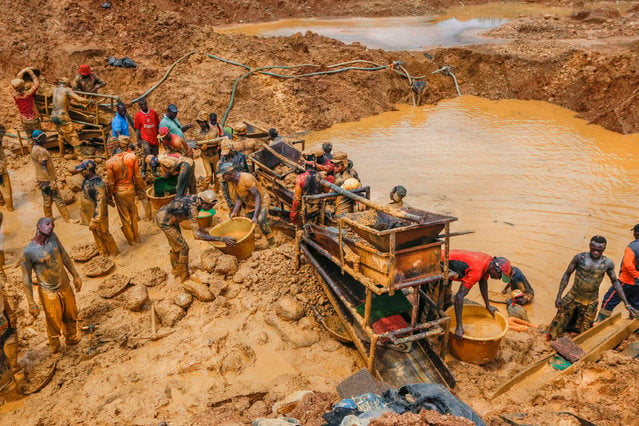The Ghanaian government has reaffirmed its dedication to combatting the growing threat of illegal small-scale mining, locally known as galamsey, as it poses significant environmental and social hazards. During a meeting on October 3, President Nana Addo Dankwa Akufo-Addo and representatives from Organised Labour convened at the Jubilee House to discuss escalating concerns over the deleterious impact of illegal mining on the nation’s water resources and forest reserves. Following this crucial dialogue, the administration issued a press release from the Ministry of Information outlining its enhanced strategies to address this longstanding crisis. The revitalized approach is underscored by commitments to expedite legal proceedings against violators, ensuring that prosecutions occur swiftly and decisively to hold accountable those responsible for the environmental degradation.
According to the Ministry’s press release, the government’s plan involves close collaboration between the Attorney-General and the Chief Justice to facilitate and expedite the adjudication process for cases related to illegal mining. This cooperation aims to deliver timely justice, encouraging a more robust legal framework to confront individuals and organizations engaged in the destruction of vital natural resources. The need for urgent action stems from the cumulative damage inflicted by illegal mining activities, which have severely compromised Ghana’s aquatic ecosystems and forest cover over the years. By prioritizing legal accountability, the government seeks to demonstrate its seriousness in addressing this issue and protecting the environment for future generations.
Moreover, the meeting led to the establishment of stringent measures designed to fortify the ban on mining activities in vulnerable areas. The government has emphatically declared that Ghana’s water bodies and forest reserves are off-limits to all types of mining operations, which includes reconnaissance and prospecting alongside small-scale mining. This declaration is part of an overarching effort to delineate ‘Red Zones’ where mining activities will not be tolerated. With law enforcement agencies poised and ready to act, the administration has granted them the authority to remove illegal miners from these protected regions swiftly. This decisive stance signals a clear intention to prioritize environmental integrity by enforcing regulations designed to safeguard critical ecological systems.
The government’s commitment to environmental protection extends to legislative actions, with plans to revoke the Environmental Protection (Mining in Forest Reserves) Regulations, 2023 (L.I. 2462). This legislation, which purportedly permits mining activities in forest reserves under specific conditions, has faced widespread criticism from environmental experts who argue that such allowances could lead to further degradation of environmental resources. By planning to repeal this regulation, the government aims to reinforce its commitment to protecting Ghana’s forest reserves from exploitation and ensuring that national interests do not come at the expense of ecological preservation. This move demonstrates an awareness of the complex balance between economic interests and environmental stewardship.
In addition to these enforcement and legislative measures, President Akufo-Addo’s discussions with Organised Labour highlight the increasing urgency surrounding the issues connected to illegal mining. This dialogue signifies a broader consensus about the need for collaborative efforts among various stakeholders, including community organizations, environmental NGOs, and government bodies, to develop comprehensive solutions that address the root causes of illegal mining. By involving diverse groups in the conversation, the government aims to foster a multi-faceted response that recognizes social contexts and informs educational campaigns directed towards responsible mining practices and resource management.
Ultimately, the renewed commitment by the Ghanaian government represents a critical turning point in the fight against illegal small-scale mining and its associated environmental challenges. The swift action to enforce bans, expedite the judicial process, and repeal controversial legislation underscores a determined resolve to change the narrative surrounding illegal mining in the country. By championing the importance of protecting natural resources, the government appears poised to take significant steps in mitigating the adverse impacts caused by galamsey. This initiative is not only crucial for environmental conservation but also vital for sustainable development, community health, and ecological balance in Ghana. The success of these measures will depend on the effective implementation and continuous engagement of all stakeholders involved in the preservation of Ghana’s rich but threatened natural heritage.














